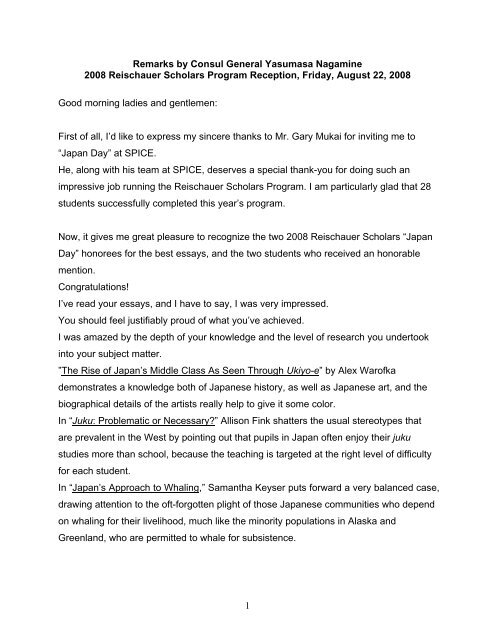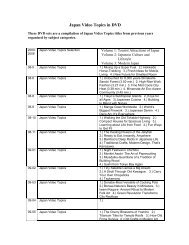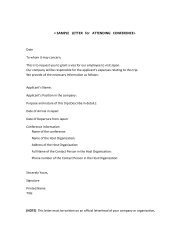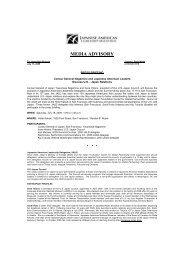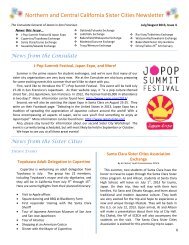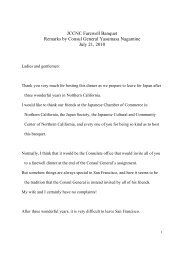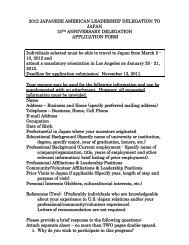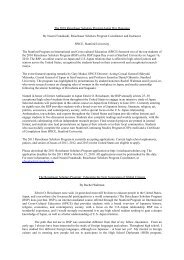Read more - Consulate General of Japan
Read more - Consulate General of Japan
Read more - Consulate General of Japan
Create successful ePaper yourself
Turn your PDF publications into a flip-book with our unique Google optimized e-Paper software.
Remarks by Consul <strong>General</strong> Yasumasa Nagamine<br />
2008 Reischauer Scholars Program Reception, Friday, August 22, 2008<br />
Good morning ladies and gentlemen:<br />
First <strong>of</strong> all, I’d like to express my sincere thanks to Mr. Gary Mukai for inviting me to<br />
“<strong>Japan</strong> Day” at SPICE.<br />
He, along with his team at SPICE, deserves a special thank-you for doing such an<br />
impressive job running the Reischauer Scholars Program. I am particularly glad that 28<br />
students successfully completed this year’s program.<br />
Now, it gives me great pleasure to recognize the two 2008 Reischauer Scholars “<strong>Japan</strong><br />
Day” honorees for the best essays, and the two students who received an honorable<br />
mention.<br />
Congratulations!<br />
I’ve read your essays, and I have to say, I was very impressed.<br />
You should feel justifiably proud <strong>of</strong> what you’ve achieved.<br />
I was amazed by the depth <strong>of</strong> your knowledge and the level <strong>of</strong> research you undertook<br />
into your subject matter.<br />
”The Rise <strong>of</strong> <strong>Japan</strong>’s Middle Class As Seen Through Ukiyo-e” by Alex War<strong>of</strong>ka<br />
demonstrates a knowledge both <strong>of</strong> <strong>Japan</strong>ese history, as well as <strong>Japan</strong>ese art, and the<br />
biographical details <strong>of</strong> the artists really help to give it some color.<br />
In “Juku: Problematic or Necessary” Allison Fink shatters the usual stereotypes that<br />
are prevalent in the West by pointing out that pupils in <strong>Japan</strong> <strong>of</strong>ten enjoy their juku<br />
studies <strong>more</strong> than school, because the teaching is targeted at the right level <strong>of</strong> difficulty<br />
for each student.<br />
In “<strong>Japan</strong>’s Approach to Whaling,” Samantha Keyser puts forward a very balanced case,<br />
drawing attention to the <strong>of</strong>t-forgotten plight <strong>of</strong> those <strong>Japan</strong>ese communities who depend<br />
on whaling for their livelihood, much like the minority populations in Alaska and<br />
Greenland, who are permitted to whale for subsistence.<br />
1
The essay on “The Kyoto Protocol” by Cheyenne McCarthy not only explains how global<br />
warming occurs, but also provides a context for the U.S.’s actions in terms <strong>of</strong> U.S.-<br />
<strong>Japan</strong> relations.<br />
Each one <strong>of</strong> these is excellent.<br />
I hope that learning about <strong>Japan</strong> as Reischauer Scholars was a rewarding experience<br />
for you.<br />
But, <strong>more</strong> importantly, I want you to come away with a clearer vision <strong>of</strong> the world we live<br />
in, where being able to bridge cross-cultural divisions is essential for successful leaders<br />
today.<br />
These days, the world is a smaller place thanks to the relentless progress <strong>of</strong><br />
globalization, so that we all need skills in international relations at one level or another.<br />
Isolation is not an option; indeed, the training <strong>of</strong> people who have a deeper<br />
understanding <strong>of</strong> foreign cultures has become even <strong>more</strong> imperative.<br />
This is why we rely on scholars, business people, government <strong>of</strong>ficials and other<br />
pr<strong>of</strong>essionals who have the capacity to view the situation with insight and deep<br />
understanding about foreign countries and regions.<br />
In this regard, programs like the Reischauer Scholars Program play a vital role in<br />
teaching students to think critically about a foreign country.<br />
Reischauer himself said that he was satisfied that “a whole army <strong>of</strong> vigorous young<br />
scholars now stands trained and eager to carry the causes I believe in far beyond what<br />
my limited abilities and energy could ever achieve.”<br />
The Reischauer Scholars Program’s main benefit is in creating young scholars<br />
specifically in the fields <strong>of</strong> <strong>Japan</strong>ese Studies and <strong>Japan</strong>ese-American relations.<br />
The U.S. and <strong>Japan</strong> aren’t just the world’s top two economic giants; they’re also<br />
important allies, sharing such basic principles as liberal democracy and freedom <strong>of</strong><br />
speech, who together face a number <strong>of</strong> globally significant issues and challenges.<br />
This alliance and partnership is based on a level <strong>of</strong> trust that comes from a deep<br />
understanding <strong>of</strong> each other’s culture, history and people, so it’s essential that we keep<br />
building this trust in order to grow the alliance further.<br />
2
That requires effort on both sides, which is why the Reischauer Scholars Program is so<br />
invaluable.<br />
Again, to quote Reischauer, “A great deal must still be done to educate people in the<br />
United States, <strong>Japan</strong>, and everywhere else for peaceful participation in a world<br />
community.”<br />
I only wish that there was a similar program for high-school students in <strong>Japan</strong> to study<br />
about the U.S. at such an advanced level.<br />
Nevertheless, as a member <strong>of</strong> the Reischauer Scholars Program advisory board, it has<br />
been my privilege to be <strong>of</strong> service where I could, and I look forward to contributing to the<br />
development <strong>of</strong> this illustrious program in the future. I share Reischauer’s commitment<br />
to scholarship, as well as his optimism for the future <strong>of</strong> the world and, hopefully, his<br />
dedication to the cause <strong>of</strong> U.S.-<strong>Japan</strong> relations.<br />
I’d like to end by thanking you for inviting me to be part <strong>of</strong> this special occasion, and<br />
once again, congratulations to our Reischauer Scholars here today.<br />
3


